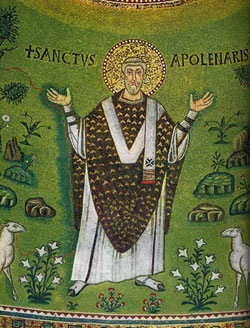
Feastday: January 8
St. Apollinaris was one of the most illustrious bishops of the second century. Eusebius, St. Jerome, Theodoret, and others speak of him in the highest terms, and they furnish us with the few facts that are known of him. He addressed an "Apology," that is, a defense, of the Christian religion to the emperor Marcus Aurelius, who, shortly before, had obtained a signal victory over the Quadi, a people inhabiting the country now called Moravia. One of his legions, the twelfth, was composed chiefly of Christians. When the army was perishing for want of water, the soldiers of this legion fell upon their knees and invoked the assistance of God. The result was sudden, for a copious rain fell, and, aided by the storm, they conquered the Germans. The emperor gave this legion the name "Thundering Legion" and mitigated his persecution.
It was to protect his flock against persecution that St. Apollinaris, who was bishop of Hierapolis in Phrygia, addressed his apology to the Emperor to implore his protection and to remind him of the favor he had received from God through the prayers of the Christians. The date of the death of St. Apollinaris is not known, but it probably occurred before that of Marcus Aurelius, about the year 175.
Free Online Catholic Classes for Anyone, Anywhere
All Free Classes Live Lessons Catholic Knowledge Quiz Confession Classes Bible Classes Catechism Classes Grade 1 Grade 2 Grade 3 Grade 4 Grade 5 Grade 6 Grade 7 Grade 8 High School Rosary Classes Way of Christ2nd century Christian writer and bishop This article is about the 2nd-century Christian leader and writer. For the 1st-century naval commander, see Claudius Apollinaris.
Saint Apollinaris Claudius, otherwise Apollinaris of Hierapolis or Apollinaris the Apologist, was a Christian leader and writer of the 2nd century.
Life
He was Bishop of Hierapolis in Phrygia and became famous for his polemical treatises against the heretics of his day, whose errors he showed to be entirely borrowed from the pagans. In 177 he published an "Apologia" for the Christians, addressed to Marcus Aurelius, and appealing to the Emperor's own experience with the "Thundering Legion", whose prayers won him the victory over the Quadi. The exact date of his death is not known, but it was probably while Marcus Aurelius was still Emperor.
Nothing survives of his writings except for a few extracts, the longest of which relates to the date of Passover. Eusebius makes mention of his work. His feast day is commemorated on January 8.





